
“Report on The Online Library of Liberty Website”
(July 2019)
By David M. Hart
[Created: 24 July, 2019]
[Revised: 4 November, 2024] |
This is part of a collection of Papers by David M. Hart
Table of Contents
- Introduction
- Part One - Web Traffic to the OLL Website
- Summary of the Data - 4 m. Pageviews and counting
- Overview
- Authors and Titles
- Groups and Collections Pages
- Essays and Study Guides
- Part Two: The State of the OLL Website (June 2019)
- Summary
- New Books and Essays
Introduction↩

Some awards the OLL has won over the years.
- Arts and Humanities Research Council (U.K.) https://oll.libertyfund.org/pages/ahrc-award
- International Political Science Association (UNESCO, Italy) http://ipsaportal.unina.it/?p=241
- Library of Congress Web Archive Minerva (U.S.) https://oll.libertyfund.org/pages/library-of-congress-web-archive-minerva
- The National Endowment for the Humanities (U.S.) https://oll.libertyfund.org/pages/neh-award
This report is in two parts. The First Part deals with the web traffic to the site over the past year (1 June 2018 - 31 May 2019). The Second Part deals with the “State of the OLL Website” in June 2019.
Part One - Web Traffic to the OLL Website↩
Since I last spoke to you in February 2018 we now have more than a full calendar year, as well as a full academic year, of Google Analytics data about the OLL website. The academic year is important since the main users of the OLL websites are professors and students in higher education and thus traffic to the OLL website closely follows the ebb and flow of the academic year, as this graph clearly shows - with a dip during the Christmas and NY break and a longer one over the summer break (June-July):

The same pattern is shown in the Google Analytics graph for the last full year June18 to May19:
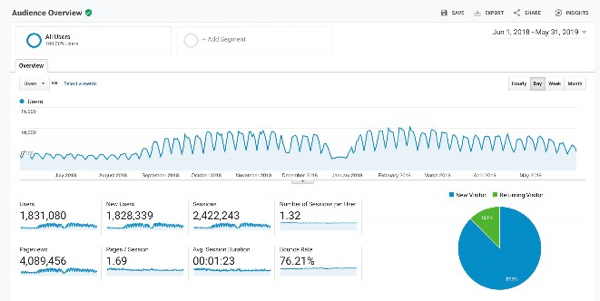
Summary of the Data - 4 m. Pageviews and counting↩
Overview
The Google Analytics data for this past full year 1 June 2018 to 31 May 2019 shows that the OLL site has had:
- 1,831,080 Users
- 2,422,243 Sessions
- 4,089,456 Pageviews 2
- 16,135 Downloads
Thus the OLL website is averaging 352,447 Pageviews per month by 167,575 Users who downloaded 18,314 files (mainly PDF books).
Year on year growth between May 2018 and May 2019 was:
- Sessions 25.6%
- Users 25.6%
- Pageviews 19.1%
Authors and Titles
The most visited author pages (which have a brief bio and links to their works online) (total 200,973; av. 16,748 per month):

- John Locke - 15,538
- J.S. Mill - 5,080
- Adam Smith - 4,903
- Herbert Spencer - 4,811
- Cicero - 4,724
- Thomas Jefferson - 4,204
- Voltaire - 3,283
- David Hume - 3,238
- Montesquieu - 2,938
- Immanuel Kant - 2,795
One of the strategies of the OLL is to “entice” people to visit the site to find our well edited, coded, and presented copies of these books. In doing so, they will see that the authors are part of related “schools of thought” and other “groups,” and that the texts are part of various “collections” and they were often the subjects of heated discussion and controversy in the past, and that they continue to be so today. We also hope that they will see the classical liberal (or pro-liberty) responses to many of these texts which we have made part of our collection of “Debates” (listed here https://oll.libertyfund.org/pages/ideas#debates) and “Provocative Pairings” of texts (see below for details).
From their main “bio page” every author is linked to other authors in the collection according to certain “groups” or categories to which they assigned, such as
- Historical Period (9 periods), e.g. the “Eighteenth Century”
- School of Thought (22 schools), e.g. the “Austrian School of Economics” or the” Scottish Enlightenment.” The most visited “School of Thought” pages were “The Anti-Federalists” (2,726 pageviews) and “The Founding Fathers of the U.S. Constitution” (2,146)
- Other Groups (11 groups), e.g. “Women on Liberty”
Information about the authors and titles is part of the detailed metadata on each which is entered into the database which drives the website.This metadata is one of the most important aspects of the OLL website as it enables us to show the connections between different authors and texts in a rich and very informative way.
This interest in the Great Books is confirmed when we examine the most viewed books (in HTML format) over this period:
Top 10 Books/Titles (HTML) (combined total 2,154,783; av. 179,565 p.m.)
- Dante, Divine Comedy - 42,702
- Locke, Essay concerning Human Understanding - 22,428
- Montesquieu, Spirit of Laws - 22,151
- John Locke, Two Treatises - 21,187
- Aristotle, Nicomachean Ethics - 14,959
- Book of Psalms - 14,766
- Rousseau, Emile - 14,729
- Beccaria, Crimes and Punishment - 14,671
- Rousseau, Social Contract - 14,135
- Hume, Treatise of Human Nature - 12,471
As with the authors, from the main “book page” every title is linked to other titles in the collection according to certain “collections” or categories to which they assigned, each of which has its own “Group” or “Collection” page, such as
- Subject Areas or Disciplines (13 areas), e.g. “History” (with 312 titles) “Economics” (500 titles)
- Topics of a more specialized nature (20 topics), for example “Free Trade” (274 pageviews). The most visited topic pages were “The English Revolution” (26,439) and “Natural Law and Natural Rights” (5,294)
- Debates (13 debates). The most visited “Debates” pages were “Loyalists and Patriots Debate the American Revolution” (3,730 pageviews), “The Debate about the French Revolution” (1,926), and “The Divine Right of Kings vs. Individual Rights” (1,391)
- Special Collections of high scholarly note (18 collections), such as the Ludwig von Mises Library and the Toronto University Press edition of The Collected Works of John Stuart Mill(1,727 pageviews)
- Other Collections (10 collections), such as Primary Sources and the works of the Founding Fathers of the American Republic and the U.S. Constitution. The most visited “Collection” page was “Banned Books” (3,171).
- Anthologies (9 anthologies) which have created out of the material in the collection
In the case of a book published by LF we provide a link to the online bookstore so the visitor can purchase it if they wish.
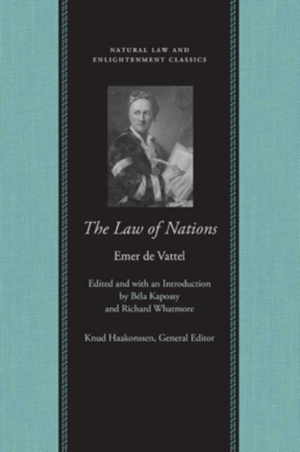 |
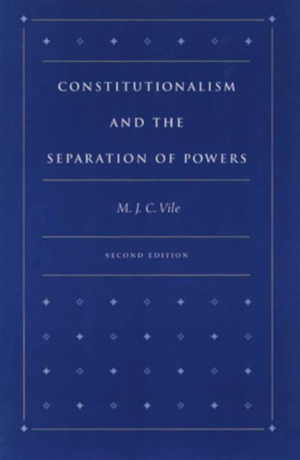 |
Although there are no LF published books in the top 10, there are 5 in the top 20. The surprise member of this group is one of our Natural Law and Enlightenment Series (Vattel). The Top 10 LF books are (with their overall ranking in brackets):
- (12.) Vile, Constitutionalism- and the Separation of Powers = 12,411
- (13. ) Mcclellan, Liberty, Order, and Justice = 12,392
- (14.) Hume, Essays Moral, Political, Literary = 11,111
- (15.) Carey, The Federalist = 10,535
- (16.) Vattel, The Law of Nations = 9,776
- (31.) Mandeville, The Fable of the Bees, Vol-1 = 7,680
- (50.) Dickinson, Empire and Nation. Letters from a Farmer = 6,494
- (52.) Rommen, The Natural Law = 6,068
- (55.) Dicey, Introduction to the Study of the Law of the Constitution = 5,752
- (58.) Tocqueville, Democracy in America (English Edition Vol. 1) = 5,636
It is hard to judge to what extent the OLL leads to additional sales of LF books. Every LF book which we have online has a link back to that book’s page in the online Book Catalog to encourage purchase of that book. We also have data on visits to two “Collections” pages which list LF titles, such as the main page “Liberty Fund Books Online” (1,867 pageviews) and separate page “The Natural Law and Enlightenment Series” (1,485).
Groups and Collections Pages

Total Pageviews 136,570; average 11,380 p.m.
There were 30 Groups pages which received more than 1,000 pageviews. The following were the most visited “Groups” and “Collections” pages sorted by type. The surprise here is the large number for our collection of texts on “The English Revolution” (26,439 pageviews).This may be the result of the strong interest in our collection of works by John Milton (6,893 pageviews of his titles) and the Leveller Tracts (2,330 views of the tracts and 1,107 views of various anthologies and essays on them). On the other hand, it is very discouraging to see the lack of interest in our topic page on “Free Trade” which ranked quite low at 78 with only 274 pageviews.
Topics:
- The English Revolution - 26,439 pageviews
- Natural Law and Natural Rights - 5,294
- The American Revolution and Constitution - 4,038
- Spontaneous Order - 2,984
- Socialism and the Classical Liberal Critique - 1,066
Debates:
- Loyalists and Patriots Debate the American Revolution - 3,730
- The Debate about the French Revolution - 1,926
- The Divine Right of Kings vs. Individual Rights - 1,391
Collections:
- Banned Books - 3,171
- Liberty Fund Books Online - 1,867
- The Collected Works of John Stuart Mill - 1,727
- Natural Law and Enlightenment Series - 1,485
- Founding Fathers’ Library - 1,387
- Classics of Liberty - 1,114
Schools of Thought:
- Anti-Federalists - 2,726
- The Founding Fathers of the U.S. Constitution - 2,146
- 19th Century French Liberalism - 1,885
- 17th Century Natural Rights Theorists - 1,489
- The Classical School of Political Economy - 1,075
- The Philosophical Radicals - 1,038
- Just misses the cut: The Austrian School - 864
Essays and Study Guides
In addition to the 1,778 titles in the OLL collection we also have 1,318 essays, study guides, and other educational material which are also heavily used. These include the following:
Top 10 Study Guides and Essays
Total Pageviews 790,415; average 65,868 p.m.
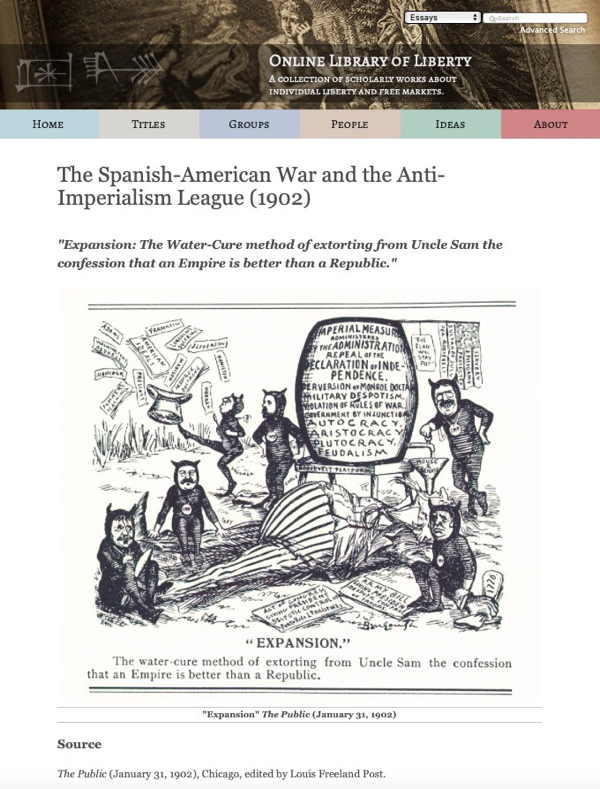
What is striking about this collection is how, by making separate essays out of book chapters (McClellan, Vile, Carey), we can drive traffic to the site. This group also includes specially commissioned essays which are very popular (Taylor). Two surprising items in this list are my own “illustrated essay” on one of our LF published authors (Sumner) from the collection “Images of Liberty and Power”; and a biographical essay on Kalidasa who was one of PFG’s authors of the great books of liberty. On the matter of art, PFG notes in his Education Memorandum (c. 1969) that art and music should be a “core part” or our education about liberty (p. 37).
- McClellan’s commentary from Liberty, Order, Justice: “The US Bill of Rights” - 86,180 pageviews (whole book 12,392 pageviews)
- A chapter from Vile, Constitutionalism: “Montesquieu and the Separation of Powers” - 35,771 (whole book 12,411 pageviews)
- Essay by Quentin Taylor: “A Guide to the Major Political Thinkers” - 16,893
- An illustrated Essay I wrote on W.G. Sumner and the League: “The Anti-Imperialist League” - 13,554
- My experimental version of Locke’s book with the text combined with Introductions, Appendices, and the Liberty Matters discussion on Locke: “The Enhanced Edition of John Locke’s Two Treatises” - 11,3691 (whole book 21,187 pageviews)
- A chapter from Carey’s In Defense of the Constitution: “Madison’s Theory of the Republic” - 10,332 (whole book 757 pageviews)
- A biographical essay on: “The Life and Works of Kalidasa” - 10,111 (whole book 985 pageviews)
- A chapter from Vile, Constitutionalism: “The Doctrine of the Separation of Powers” - 9,351 (whole book 757 pageviews)
- A chapter from McClellan, Liberty, Order, and Justice: “Rule of Law and U.S. Constitution” - 8,683 (whole book 12,392 pageviews)
- A chapter from Clausewitz, On War: “War as Politics by Other Means” - 8,465 (whole book 2,916 pageviews)
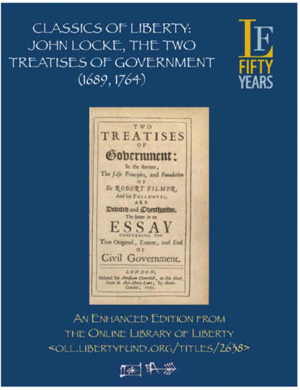
I would like to note the surprisingly high number of visits which our experimental “enhanced” edition of John Locke’s Two Treatises of Civil Government received (11,369 pageviews) https://oll.libertyfund.org/pages/john-locke-two-treatises-1689. Its companion volumes in this experiment (made in 2015) are Hugo Grotius, The Enhanced Edition of The Rights of War and Peace (1625) (4,306) https://oll.libertyfund.org/pages/grotius-war-peace, and Wilhelm von Humboldt’s The Sphere and Duties of Government (1854) (125) https://oll.libertyfund.org/pages/humboldt-government .
This edition of Locke’s Two Treatises combines the text from the OLL (the historical 1764 Hollis edition, which on its own got 21,187 pageviews) with supplementary material about Locke’s political theory written by modern scholars, most notably the “Liberty Matters” online discussion forum on Locke’s theory of property and some other study guides. Its success suggests that we can increase traffic to the site by providing texts with added or “enhanced” value for teaching and learning purposes.
Top 10 Quotes about Liberty and Power
Total Pageviews 325,791; average 27,149 p.m.
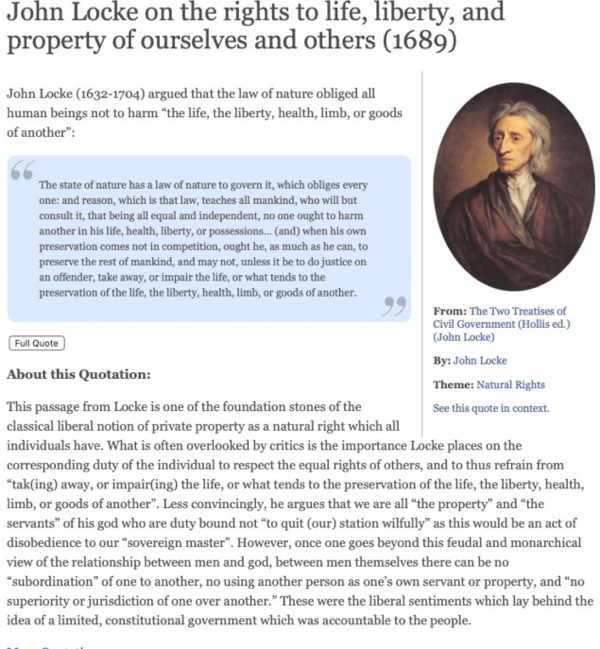
In order to make our texts more approachable to our readers (especially college students) I select a “quote of the week” to highlight on the front page of the website and to promote on Facebook. The idea is to catch the reader’s attention with a pithy quote on a currently relevant topic, provide some information about why the author and the quote are important, and provide a link to the full text to encourage further reading.
It is important to note that it was an explicit goal of PFG to get people to read the great books about liberty for themselves, in the original language if possible (“Introduction to the Goodrich Seminar Room,” p. xvi).
We now have 601 such “Quotations about Liberty and Power” which are classified into 31 topics. John Locke and Thomas Jefferson are always very popular authors. Locke on self-ownership is surprisingly high. The top 10 viewed quotes over the past year are:
- John Locke on the rights to life, liberty, and property of ourselves and others (1689) - 37,788 pageviews
- Jefferson on the right to change one’s government (1776) - 14,775
- Jefferson’s preference for “newspapers without government” over “government without newspapers” (1787) - 13,956
- Socrates as the “gadfly” of the state (4thC BC) - 13,114
- John Locke on “perfect freedom” in the state of nature (1689) - 10,389
- Lord Acton on “Power tends to corrupt and absolute power corrupts absolutely” (1887) - 8,285
- Aristotle insists that man is either a political animal (the natural state) or an outcast like a “bird which flies alone” (4thC BC) - 5,279
- John Locke on the idea that “wherever law ends, tyranny begins” (1689) - 4,548
- Under Magna Carta the King cannot impose taxes without the approval of the “common counsel” of the kingdom (1215) - 4,025
- Luke, Taxes, and the Birth of Jesus (85) - 4,242
Top 10 Liberty Matters
Total Pageviews 22,966; average 1,913 p.m.
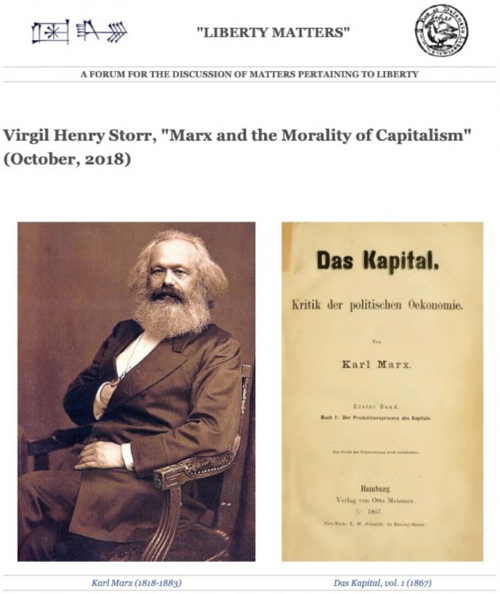
The “Liberty Matters” online discussion forum is now in its 7th year with a total of 40 discussions to date. We invite four scholars to discuss an important text or author online for a month. The authors and titles discussed are authors of the great books of liberty (Locke, Hume, Smith) and/or authors of books published by LF (Buchanan, Kirzner). Since 2018 was the bicentennial of the birth of Karl Marx, and because of the positive attention he was getting in the press (such as the NYT), we had a discussion on him in October 2018 with the idea of indirectly criticizing contemporary socialism by criticizing its founding theorists. This proved to be the most visited discussion we have ever had.
The most visited LM discussions over the past year have been:
- Karl Marx - 2,845 Pageviews
- Shakespeare - 2,174
- Herbert Sencer - 2,140
- Ludwig Lachmann - 1,418
- Classical Liberal Class Analysis - 1,231
- John Locke - 1,035
- Hugo Grotius - 975
- Frederick Douglass - 897
- Frédéric Bastiat - 806
- Vilfredo Pareto - 796
It should be noted that older LM discussions which date back to 2013 and 2014, such as John Locke (Jan. 2013) and Herbert Spencer (Nov. 2014), continue to be read some years after their first appearance. This suggests these are not ephemeral items of the moment but have lasting scholarly value.
It should also be noted that in 2019 we completed an eight part series on Austrian Economics which included discussions of:
- Ludwig von Mises (twice): Lawrence White, “Ludwig von Mises’s The Theory of Money and Credit at 101” (January 2014)
- Eugen von Böhm-Bawerk: Richard M. Ebeling, “Assessing Böhm-Bawerk’s Contribution to Economics after a Hundred Years” (April, 2015)
- Ludwig von Mises: Sanford Ikeda,“The Misesian Paradox: Interventionism Is Not Sustainable” (March 2016)
- Israel M. Kirzner: Peter J. Boettke, “Israel M. Kirzner on Competitive Behavior, Industrial Structure, and the Entrepreneurial Market Process” (March 2017)
- Friedrich Hayek: Peter Boettke, “Hayek’s Epistemic Liberalism” (September 2017)
- Ludwig Lachmann: Peter Lewin, “Ludwig Lachmann – Enigmatic and Controversial Austrian Economist” (July, 2018)
- Frank Fetter: Matthew McCaffrey, “Frank Fetter and the Austrian Tradition in the United States” (January, 2019)
Other interesting pages which were well visited
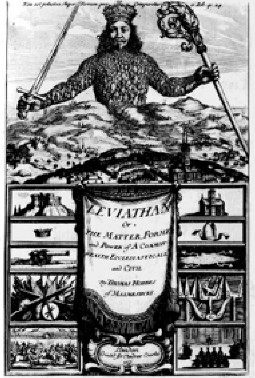 |
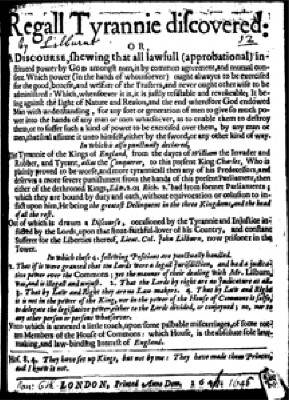 |
 |
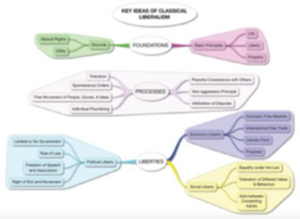 |
This is a grab bag of pages which got significant visits over the course of the year. It again illustrates how important material can be highlighted in the OLL website and attract significant traffic. Many of these are complete surprises to me, in particular the interest shown in the wonderful illustrations of the Duke de Berry’s “Book of Hours” (c. 1416) with accompanying quotations on economic activity from Adam Smith’s Wealth of Nations which I added (4,349 pageviews), and our growing list of “Key Documents of Liberty” which lists over 100 important constitutions, bills of rights, petitions, and other political documents (2,135 pageviews):
- An essay on “The Most Commonly Read Books of the Founding Generation”: The Founding Fathers’ Library - 5,886 pageviews
- two illustrated essays from our collection of “Images of Liberty and Power”:
- “The très riches heures du duc de Berry” (1416) (with quotes by Smith and other economists on the economic activity depicted in the illustrations) - 4,349
- “The Divine Right of Kings or Regal Tyranny as depicted in the work of Hobbes and Lilburne” - 2,142
- our recently completed 7 volume collection of political tracts from the English Revolution: Leveller Tracts (combined) - 3,763
- our anthology of some of the most important works in the OLL collection (with over 100 items): The OLL Reader - 3,635
- Most popular extract: David Hume, “Idea of a Perfect Commonwealth” (1777) - 1,365
- a revised and improved page which lists The Great Books of Liberty as formulated by PFG - 3,623
- a graphical guide to the ”12 Key Concepts of Liberty” with links to further reading - 3,335
- a translation of a speech by Toqueville in 1848 criticizing socialism: “Tocqueville on Socialism” - 3,439
- a brief essay by me on a famous quote attributed to Bastiat (but not actually by him): “Bastiat on Goods crossing Borders” - 2,777
- a chapter from a book by Cadoux, The Early Christian Attitude to War (1919): “Jesus on War” - 2,517
- a collection of over 100 important constitutions, bills of rights, petitions, and other political documents: “Key Documents of Liberty” - 2,135
Part Two: The State of the OLL Website (June 2019)↩
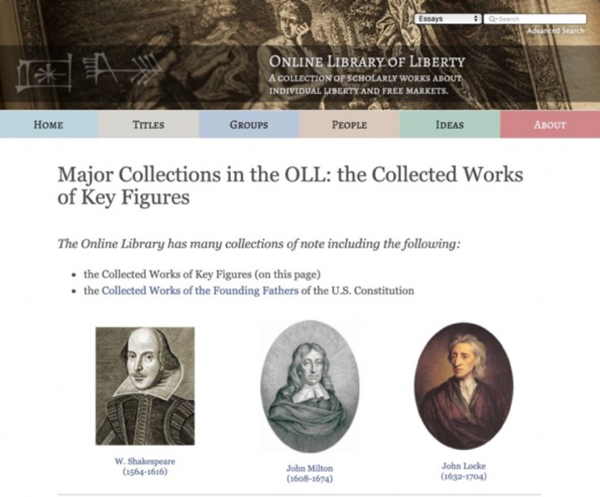
Summary
Today the OLL has …
- 1,778 titles organized in 12 Subject Areas (Art, Economics (500 titles), History (312), Law (136), Literature, Music, Philosophy (178), Political Theory (671), Religion, Science, Sociology, War and Peace), 20 Topics, 13 Debates, 18 Major Collections, and 270 online versions of LF books
- by 489 authors organized by Historical Period and in 29 Schools of Thought
- 1,318 essays and study guides (in 23 categories), including
- 64 “illustrated essays” in Images of Liberty and Power
- 92 items in the OLL Reader with another 173 items in the additional expanded sections
- 100+ Key Documents of Liberty
- 40 Liberty Matters online discussions
- 601 Quotations about Liberty and Power (with an accompanying mini-essay)
The OLL contains 18 Major Collections of texts with sizable holdings in eleven key areas of study. These include:
18 Major Collections:
- The Works of Ludwig von Mises
- Natural Law and Enlightenment Series
- The Works of J.S. Mill (new and better table of contents page for collection)
- The Works of David Ricardo
- The Works of Lysander Spooner
- The Works of Israel Kirzner
- The Works of James Buchanan
- The Works of Gordon Tullock
- The Works of Arthur Seldon
- The Works of Frédéric Bastiat
- The Works of Jeremy Bentham (new and better table of contents page for collection)
- The Works of the Founding Fathers (Washington, Adams, Jefferson, Wilson, Paine, Jay, Madison, Hamilton)
- The Founders’ Constitution (hosted by U. Chicago Press; we have detailed linked Table of Contents page)
- Collections of Charters and Constitutions
- The Leveller Tracts
- IHS Studies in Economic Theory
- PFG’s Great Books of Liberty
- The Intellectual Portrait Series
Sizable Holdings in Certain Core Areas:
- The American Revolution and Constitution (172 titles)
- The Scottish Enlightenment (13 authors)
- The French Enlightenment (14 authors)
- The English Revolution (38 titles)
- The French Revolution (39 titles)
- Natural Law and Natural Rights (19 titles)
- French Classical Liberal Thought (21 titles)
- 19th Century English Classical Liberalism (17 authors)
- The Classical School of Economics (16 authors)
- The Austrian School of Economics (21 authors)
- The Public Choice School of Economics (18 authors)
New Books and Essays
Summary
Since my last Report (Feb. 2018) I have added:
- 35 new book titles and significantly revised several others already online;
- 9 new Liberty Matters online discussions
- 40 new Quotations about Liberty and Power
- several dozen items to the OLL Reader
- a major Study Guide and Reader on Socialism
The Core Areas of our Collection
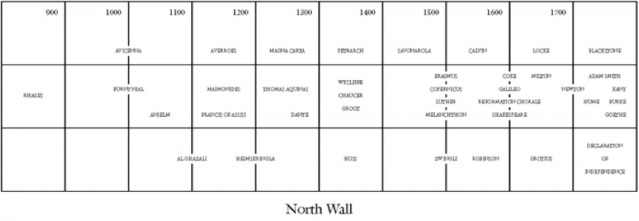
We continue to add material in our core areas of the OLL collection. Three areas in particular were well covered, the “Enlightenment,” the “American Revolution, Founding and Constitution,” and the “Great Books of Liberty.” It should be noted the importance PFG himself placed on the first two, as shown with the names on the last two panels on the North Wall of the Goodrich Seminar Room. The culminating point of the entire collection of names was “The Declaration of Independence” and I do not think it is too much of a stretch to think that PFG was looking to lay the intellectual foundations for a “second Enlightenment” which would usher in a “new declaration of independence” and a new “beneficial revolution” (EM, p. 21) and constitution which would not be a “compromise document” like the first (EM, p. 22).
We have added material in the following areas:
- The Great Books of Liberty:
- Additions:
- an improved introductory page
- a new section on “Provocative Pairings” of great books about liberty
- The Main Collection:
- old version “The Goodrich Seminar Room https://oll.libertyfund.org/pages/goodrich-seminar-room
- new version “The Great Books of Liberty” https://oll.libertyfund.org/pages/great-books
- Additions:
- The Enlightenment:
- Additions:
- Natural Law and Enlightenment Series: Bellarmine, Suárez
- the “philosophical histories” of William Robertson,
- LM on David Hume, Denis Diderot
- The Main Collection:
- The French Enlightenment https://oll.libertyfund.org/groups/21
- The Scottish Enlightenment https://oll.libertyfund.org/groups/19
- Natural Law and Enlightenment https://oll.libertyfund.org/groups/59
- Additions:
- The American Revolution, Founding and Constitution:
- Additions:
- Anthologies by Greene and York,
- Thomas Hutchinson
- The Main Collection:1.T he American Revolution and Constitution (172 titles) https://oll.libertyfund.org/groups/65
- Additions:
- The Founding Fathers https://oll.libertyfund.org/groups/36
- The Anti-Federalists https://oll.libertyfund.org/groups/121
- The Founders’ Constitution https://oll.libertyfund.org/pages/founders-constitution
- The Austrian School of Economics
- Additions:
- LM on Ludwig Lachmann, Frank Fetter
- The Main Collection:
- The Austrian School https://oll.libertyfund.org/groups/8
- Other works on Free Market Economics:
- Additions:
- Armen Alchian
- The Main Collection:
- Public Choice https://oll.libertyfund.org/groups/1142.Classical School of Economics https://oll.libertyfund.org/groups/40
- Pre-Smithian Economists https://oll.libertyfund.org/groups/37
- French economic and political thought:
- Additions:
- Richard Cantillon, Germaine Staël, Benjamin Constant
- LM on Constant, Staël, Bastiat
- The Main Collection:
- The Idéologues https://oll.libertyfund.org/groups/107
- 19th Century French Liberalism https://oll.libertyfund.org/groups/28
Other Anglo-American and European defenders of individual liberty:
- Additions:
- W.G. Sumner
- 19th century anti-slavery tracts,
- 17th century Leveller political tracts.
- LM on Vilfredo Pareto
- The Main Collection:
- The Levellers https://oll.libertyfund.org/groups/68
- The Abolitionists https://oll.libertyfund.org/groups/33
- Socialism and its Critics:
- Additions:
- Karl Marx, G.B. Shaw, Böhm-Bawerk
- LM discussion of Marx in Oct. 2018
- dozens of quotations and items in the OLL Reader
- The Main Collection:
- Socialism https://oll.libertyfund.org/groups/29]
- Critique of Socialism https://oll.libertyfund.org/groups/64
- Protectionism and its Critics:
- Additions:
- Friedrich List
- dozens of quotations and items in the OLL Reader
- The Main Collection:
- Free Trade https://oll.libertyfund.org/groups/138
New Books added to the OLL Collection
 |
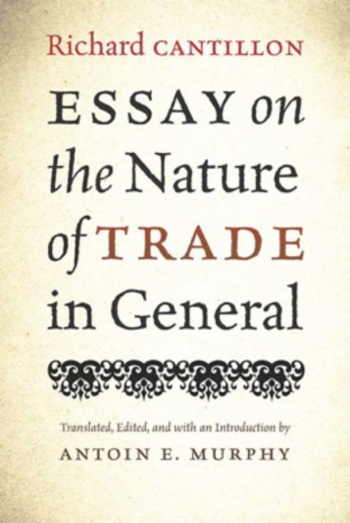 |
The following books/titles were added to the OLL collection:
- Robert Bellarmine, On Temporal and Spiritual Authority (2012)
- Jack P. Greene, Exploring the Bounds of Liberty: Political Writings of Colonial British America from the Glorious Revolution to the American Revolution. Vol. 3 (1755-1774) (2018)
- Exploring the Bounds of Liberty: Political Writings of Colonial British America from the Glorious Revolution to the American Revolution. Vol. 2 (1734-1755) (2018)
- Exploring the Bounds of Liberty: Political Writings of Colonial British America from the Glorious Revolution to the American Revolution. Vol. 1 (1687-1732) (2018)
- Richard Cantillon, Essay on the Nature of Trade in General (2015)
- William Robertson, The Works of William Robertson. Vol. 8. The History of America, books 9-10. An Historical Disquisition concerning Ancient India. (1840)
- The Works of William Robertson. Vol. 7. The History of America, books 5-8.
- The Works of William Robertson. Vol. 6. A Catalogue of Spanish Books and Manuscripts and The History of America, books 1-4.
- The Works of William Robertson. Vol. 5. The History of the Reign of the Emperor Charles V, books 8-12
- The Works of William Robertson, vol. 4. The History of the Reign of the Emperor Charles V, books 2-7
- The Works of William Robertson, vol. 3. A View of the Progress of Society in Europe and The History of the Reign of the Emperor Charles V, book 1
- The Works of William Robertson, vol. 2. The History of Scotland vol.2
- The Works of William Robertson, vol. 1. The History of Scotland, Vol. 1
- Germaine de Staël, Des circonstances actuelles qui peuvent terminer la Révolution et des principes qui doivent fonder la république en France (1906)
- Armen A. Alchian , Universal Economics (2018)
- Thomas Hutchinson, Strictures upon the Declaration of the Congress at Philadelphia (1776)
- Anti-Slavery Tracts. Second Series, nos. 1-25 (1860-62)
- Anti-Slavery Tracts. First Series, Nos. 1-20 (1855-56)
- Eugen von Böhm-Bawerk, Zum Abschluss des Marxschen Systems (1896)
- Eugen von Böhm-Bawerk, Karl Marx and the close of his system, a criticism (1898)
- Karl Marx, Das Kapital. Kritik der politischen Ökonomie. Buch III, zweiter Theil (1894)
- Das Kapital. Kritik der politischen Ökonomie. Buch III, erster Theil (1894)
- Das Kapital. Kritik der politischen Ökonomie. Buch 2 (1885)
- Das Kapital. Kritik der politischen Ökonomie. Buch 1 (1890)
- Das Kapital. Kritik der politischen Oekonomie. Buch 1 (1867)
- Manifesto of the Communist Party (1888, 1910)
- Manifest der Kommunistischen Partei. Veröffentlicht im Februar 1848 (1848)
- George Bernard Shaw, A Manifesto. Fabian Tracts No. 2 (1884)
- William Graham Sumner, Earth-Hunger and Other Essays (1913)
- Neil L. York, The Crisis: A British Defense of American Rights, 1775–1776 (2016)
- Benjamin Constant, On Religion Considered in Its Source, Its Forms, and Its Developments (2017)
- Friedrich List , Outlines of American Political Economy, in a series of letters (1827)
- Tracts on Liberty by the Levellers and their Critics vol. 7 (1650-1660) (2018)
- Tracts on Liberty by the Levellers and their Critics vol. 6 (1649) (2018)
- Francisco Suárez, Selections from Three Works (2015)
- Titles which have been corrected or revised significantly
- Herodotus, The History, vols. 1-3
- Lalor’s Cyclopedia (1881)
- the Works of Jeremy Bentham (1843)
- Ford, Pamphlets on the Constitution of the United States (1888)
- Frédéric Bastiat, The State
- Frédéric Bastiat, The Law
- A revised version of the Collected Works of Spooner, 5 vols. now in chronological order of date of publication
It should be noted, that we have included some texts in their original language in accordance with PFG’s intention that “Where practical, the original language is also available for those who have the capacity to exercise a truly scientific desire to verify by looking at the original” (IGSR, p. xvi).
New “Liberty Matters” Discussions
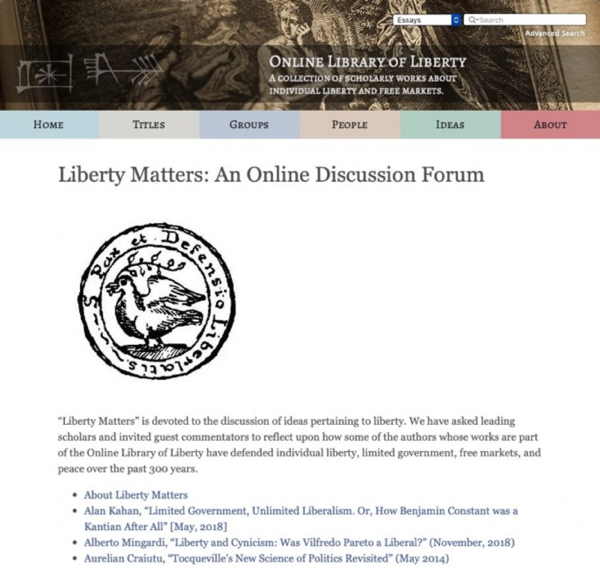
The “Liberty Matters” online discussion forum is designed to provide a small group of invited scholars an opportunity to have a “conversation” about one of the great books of liberty we have in the OLL collection, or other selected relevant topics of an historical nature. We also include with each discussion a lengthy reading list of books and articles to encourage further reading, and copious links to the texts to encourage readers to explore these texts for themselves as PFG intended.
The following Liberty Matters online discussions were added (January 2018 - May 2019):
- No. 32. (January, 2018): Nicholas Capaldi, “The Place of Liberty in David Hume’s Project” (January, 2018). Participants: Daniel B. Klein, Andrew Sabl, Chandran Kukathas, Mark E. Yellin
- No. 33. (March, 2018): Henry C. Clark, "How Radical Was the Political Thought of the Encyclopédie?" (March, 2018). Participants: Dan Edelstein, Kent Wright, Andrew Jainchill.
- No. 34. (May, 2018): Alan Kahan, “Limited Government, Unlimited Liberalism. Or, How Benjamin Constant was a Kantian After All” (May, 2018). Participants: Aurelian Craiutu, Bryan Garsten, and Jacob T. Levy.
- No. 35 (July 2018): Peter Lewin, “Ludwig Lachmann – Enigmatic and Controversial Austrian Economist” (July, 2018). Participants: Hans Eicholz, Paul Lewis, Mario J. Rizzo, and Bill Tulloh.
- No. 36 (Oct. 2018): Virgil Storr, “Marx and the Morality of Capitalism” (October, 2018). Participants: Pete Boettke, Steve Horwitz, David Prychitko, and David Hart.
- No. 37 (Nov. 2018): Alberto Mingardi, “Liberty and Cynicism: Was Vilfredo Pareto a Liberal?” (November, 2018). Participants: Giandomenica Becchio, Rosolino Candela, and Richard E. Wagner.
- No. 38 (January 2019): Matthew McCaffrey, “Frank Fetter and the Austrian Tradition in the United States” (January, 2019). Participants: Geoffrey M. Hodgson, Peter Lewin, and Joseph T. Salerno.
- No. 39 (March 2019): Aurelian Craiutu, "How to Combat Fanaticism and the Spirit of Party: Germaine de Staël's Lesson" (March 2019). Participants: Benjamin Hoffmann, Catriona Seth, and K. Steven Vincent.
- No. 40 (May 2019): David M. Hart, "Reassessing Bastiat's Economic Harmonies after 160 Years" (May 2019). Participants: Donald J. Boudreaux, Guido Hülsmann, and Joseph T. Salerno.
Quotations about Liberty and Power
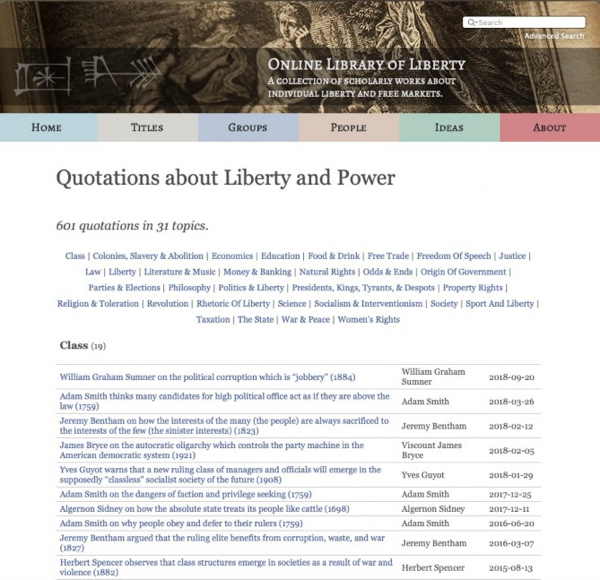
The quotations are categorized by theme (there are 31 covering economic, political, and social theory, literature, history, philosophy, and so on), there is a brief commentary and explanation about the quote’s importance, and a link back to the text to enable the reader to explore the topic in more detail. The collection provides a useful survey of the history of classical liberal and libertarian thought over the past 500 years and is one of our “gateways” into the main collection of texts.
- over the past year there was a focus on the topics of free trade and socialism in order to complement the expanded material in the OLL Reader
- the milestone of “600” quotations was reached in December
- the compilation volume is available in PDF, ePub and Kindle formats https://oll.libertyfund.org/titles/2771. This edition contains 600 quotations which have appeared from the launch of the OLL site in March 2004 up to the end of December 2018 (making the PDF version some 1,354 pages long).
The OLL Reader
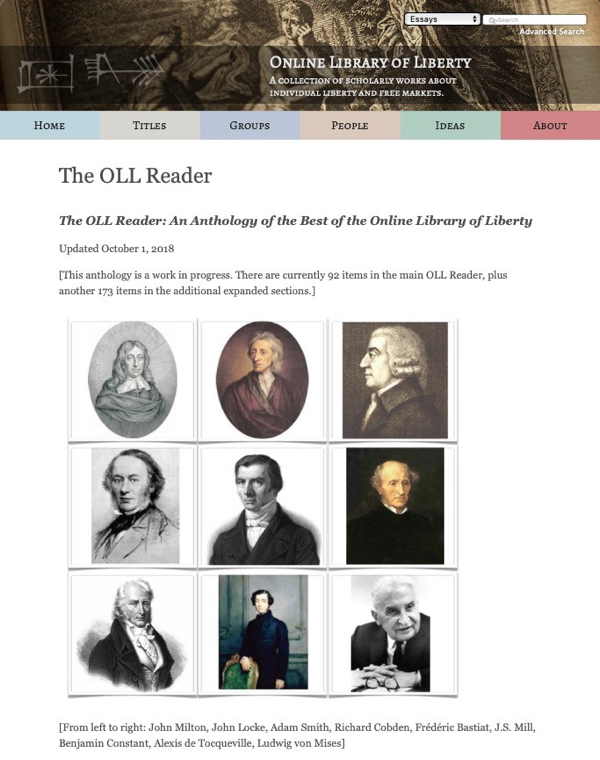
The OLL Reader https://oll.libertyfund.org/pages/oll-reader is divided into 12 sections and provides a useful introduction to classical liberal and libertarian political and economic thought. It is constantly being expanded as new material becomes available. There are a total of 92 items in the main OLL Reader, plus another 173 items in the additional expanded sections. Like the collection of “Quotations about Liberty and Power” this is a “gateway” to encourage readers to learn about a key idea by reading an extract in the hope that they will click on the link to read more of the original text for themselves.
The OLL Reader consists of the following parts:
- I: Scepticism about Power (8 items)
- II: The Basic Principles (11)
- III: Political Liberty (8)
- IV: Economic Liberty (12 items plus a new subsection on “Free Trade” (7))
- V: Individual Liberty (5)
- VI: War and Peace (4)
- VII: Key Legal and Political Documents (8) plus a separate collection of 100 items)
- VIII: The History of Liberty and Power (2)
- IX: The Literature of Liberty (2)
- X: The Critique of Socialism and Interventionism (15) plus a new Reader and Study Guide
- XI: The Ruling Class and the State (5) plus a new separate collection
- XII: Visions of the Future (7)
In 2018 the OLL Reader https://oll.libertyfund.org/pages/oll-reader was expanded significantly to include more material on:
- Free Trade (12 items in the OLL Reader and 7 new items in the expanded section https://oll.libertyfund.org/pages/oll-reader#freetrade
- Key Documents of Liberty https://oll.libertyfund.org/pages/oll-reader#part7 (8 items in the OLL Reader and 100 in separate collection https://oll.libertyfund.org/pages/key-documents with new items on Leveller Petitions and Agreements)
- the Critique of Socialism https://oll.libertyfund.org/pages/oll-reader#`part10 (15 items in the OLL Reader and many more in the new Study Guide https://oll.libertyfund.org/pages/socialism)
- the Ruling Class and the State (5 items in the OLL Reader and many more in the new section https://oll.libertyfund.org/pages/ruling-class-anthology).
Socialism: A Study Guide and Reader
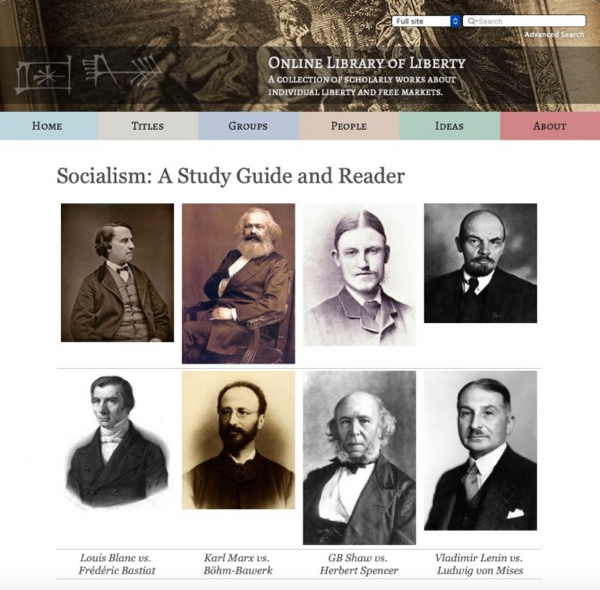
A major project in 2018 was the publication of a lengthy 90 page Study Guide and Reader on socialism, which examines the long-standing clash between Socialism and Marxism, and Classical Liberalism over the past 200 years or so. It builds upon the “Debate” page on “Fabian Socialism vs. Radical Liberalism” (606 pageviews) and the “Topic” page on “Socialism and the Classical Liberal Critique” (1,066 pageviews) which we have had for some time.
The new Study Guide provides a brief history of the socialist and Marxist traditions, some of its main criticisms of the free market, the classical liberal response to these criticisms, extensive quotes from some of these texts, and links to them in the OLL collection.
It was designed to complement the Liberty Matters discussion we organized to “commemorate” the bicentennial of the birth of Karl Marx (1818-1883), although like Marc Anthony we came to “bury Marx not praise him.” It is also a good example of the kind of educational “manuals” PFG had in mind to help readers learn about the subject matter (EM, p. 38) outside of the university system.
This Study Guide and Reader’s main page has been viewed 1,189 times.
The Great Books of Liberty
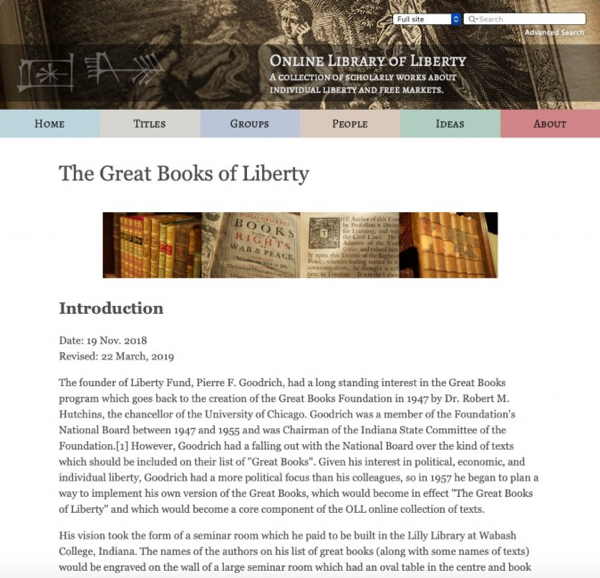
The Great Books of Liberty was a core feature of PFG’s vision to promote the study and understanding of liberty by encouraging people to read these texts for themselves. This page https://oll.libertyfund.org/pages/great-books is the main entry point of our collection and it was substantially revised and improved in 2018. The new front page consolidates two of our older pages and lists 152 authors and documents and provides links to the author main pages, the texts, any relevant debates, and study guides.
This screen snapshot below shows what the new page now looks like:
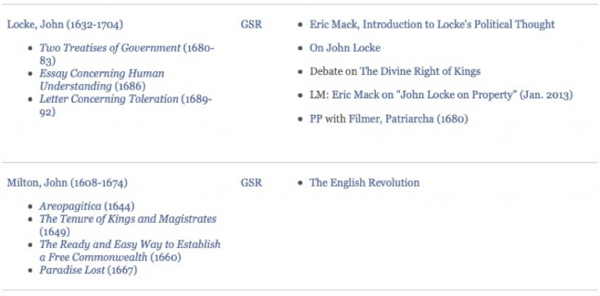
Key:
- Left: author’s name with a link to that author’s main “bio page”; then a list of works by that author which we have in the collection
- Middle: “GSR” indicates that this author is included in the Goodrich Seminar Room collection with a link to that author’s entry
- Right: a list with links to any study guides or essays we have on that author, including “Debates,” Liberty Matters discussions, or “Provocative Pairings” (PP) of texts
There is also a new section called “Provocative Pairings” which is designed to stimulate debate and discussion by pairing contrasting classic texts on the subject of “liberty” vs. “power.” The idea is to include contemporary pro- or anti-liberty texts alongside a well-known classic text, such as Robert Filmer’s defense of the divine right of kings, Patriarcha (1680) with John Locke’s Two Treatise of Government (1689). We can then link these texts to the other educational material we have on the OLL, such as Eric Mack’s LM’s discussion on “John Locke on Property” and his essay on “An Introduction to the Political Thought of John Locke” or our “Enhanced Edition” of Locke’s Two Treatises. The latter was one of our “Top 10” Guides getting 11,369 views. To date there are 19 such “provocative pairings” online. https://oll.libertyfund.org/pages/pairings.
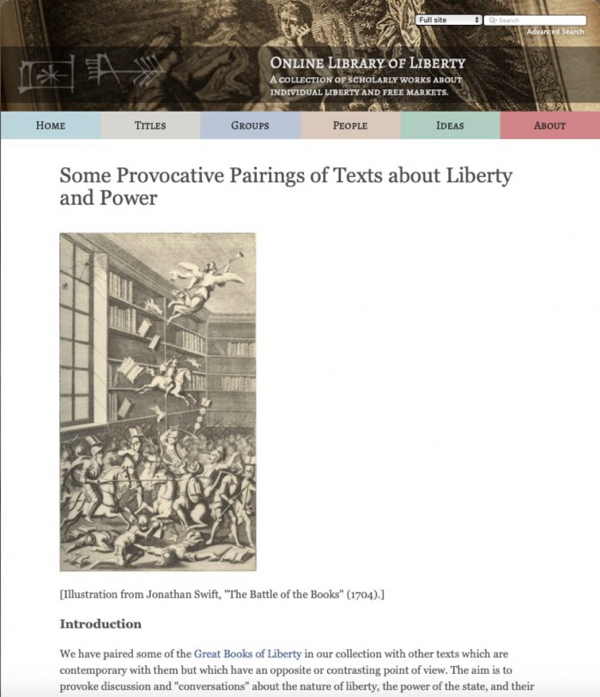
The following collection of “provocative pairings” spans the early 16th century and goes up to the end of WW2:
- Machiavelli, The Prince (1513) vs. Desiderius Erasmus, The Education of a Christian Prince (1515)
- Thomas Hobbes, Leviathan (1651) vs. either, James Harrington, The Commonwealth of Oceana (1656) , or some Leveller Tracts by Richard Overton and John Lilburne in the late 1640s, or Richard Cumberland), A Treatise of the Laws of Nature (1672)
- Sir Robert Filmer, Patriarcha, or the Natural Power of Kings (1680) vs. John Locke, The Two Treatises of Civil Government (1689) or James Tyrrell’s Patriarcha non monarcha. The Patriarch unmonarch’d (1681)
- Montesquieu, Spirit of Laws (1748) vs. Destutt de Tracy, A Commentary and Review of Montesquieu’s ’Spirit of Laws’ (1806)
- Adam Smith, The Theory of Moral Sentiments (1759) vs J.-J. Rousseau Discourse on the Origin and Basis of Inequality Among Men (1754) and The Social Contract (1762)
- Beccaria, An Essay on Crimes and Punishments (1764) vs. Bentham, Panopticon, or the Inspection-House (1787)
- Adam Smith, The Wealth of Nations (1776) vs. Thomas Mun, England’s Treasure by Forraign Trade; or, the Ballance of our Forraign Trade is the Rule of our Treasure (1644)
- Edmund Burke, Reflections on the French Revolution (1790) vs. Thomas Paine, Rights of Man (1791)
- Thomas Malthus, An Essay on Population (1798, 1826) vs. William Godwin, Of Population (1820)
- Friedrich List, Das National System der politischen Oekonomie (The National System of Political Economy) (1841) vs. Frédéric Bastiat, Sophismes Économiques (Economic Sophisms) (1846, 1848)
- Karl Marx, The Communist Manifesto (1848) vs. Frédéric Bastiat, The State (1848)
- John Stuart Mill, On Liberty (1859) vs. James Fitzjames Stephen, Liberty, Equality, Fraternity (1874)
- Karl Marx, Das Kapital vol. 1 (1867) vs. Frédéric Bastiat, Economic Harmonies (1851) or John Stuart Mill, Principles of Political Economy (1848)
- John Stuart Mill, Utilitarianism (1861) vs. Herbert Spencer, Social Statics (1851) or The Principles of Ethics (1879)
- George Bernard Shaw, Fabian Essays in Socialism (1889) vs. Thomas Mackay, A Plea for Liberty: An Argument against Socialism and Socialistic Legislation (1891)
- Edward Bellamy, Looking Backward: 2000–1887 (1888) vs. Eugen Richter, Pictures of the Socialist Future (1893)
- Lenin, The State and Revolution (Aug.-Sept. 1917) vs. Ludwig von Mises, “Economic Calculation in the Socialist Commonwealth“ (1920) and Socialism (1922)
- Ludwig von Mises, Nation, State, and Economy (1919) vs. Carl Schmitt on Dictatorship (1921), Political Theology (1922), and The Crisis of Parliamentary Democracy (1923)
- The Beveridge Report (Social Insurance and Allied Services) (1942) vs. Friedrich Hayek, The Road to Serfdom (1944)
The OLL Search Engine
The advanced search features of the OLL website make it particularly valuable to scholars and teachers who wish to look for names or key terms in the texts in our collection, and to be able to cite the location of their searches in their research papers and articles for further reference. They have the choice of three standard ways to cite references: the MLA, APA, and Turabian styles.

Users of the site can search books in a number of different ways:
- a single book once they have opened that book’s page
- all books by a particular author from the main author page
- all volumes of a multi-volume set from that book’s “Set” page
- or very specific and detailed searches by going to the Advanced Search page
The Advanced Search Feature
What ties all the texts together is the Advanced Search feature which makes use of the detailed metadata we have on each author and text to enable the user to search across the entire collection. The texts are coded in such a way that it allows us to show the results of the search within the entire paragraph in which it is situated and to cite the reference to that specific paragraph which can then be used by the reader in their research articles and papers.
For example, a term, like “invisible hand”, can be searched across “Author” by limiting the search to an historical period, a school of thought, and nationality; or across “Title” by historical period, subject area, or topic.
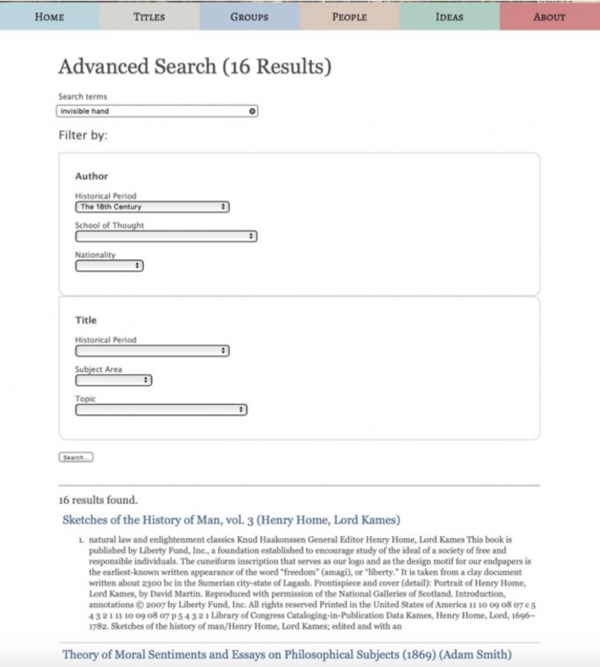
Here we have an example of a search for the phrase “invisible hand” used by authors living in the 18th Century, which produces 16 results, the first of which is in Lord Kames’ book Sketches of the History of Man (1778) which is one of the titles in our Natural Law and Enlightenment Series.
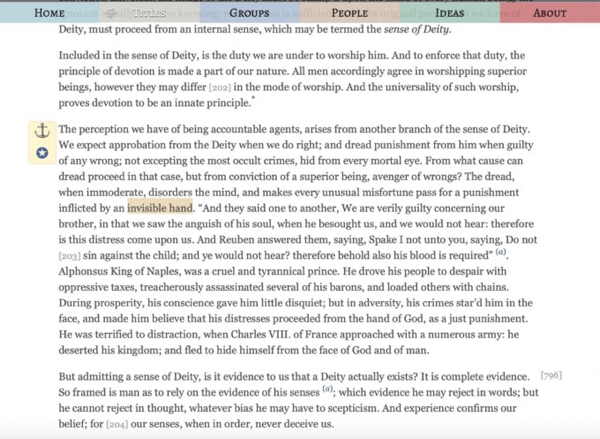
The search term is highlighted in the paragraph in which it is located. The two symbols at the top left hand corner of the paragraph can be selected by the user to show just the URL for that paragraph (the Anchor symbol) or the complete citation reference (the Star Symbol). This information can be copied and pasted by the user for their own use.
Anchor: https://oll.libertyfund.org/titles/2034#Home_1400.03_551
Star: Henry Home, Lord Kames, Sketches of the History of Man Considerably enlarged by the last additions and corrections of the author, edited and with an Introduction by James A. Harris (Indianapolis: Liberty Fund, 2007). 3 Vols. Vol. 3. 7/10/2019. https://oll.libertyfund.org/titles/2034#Home_1400.03_551
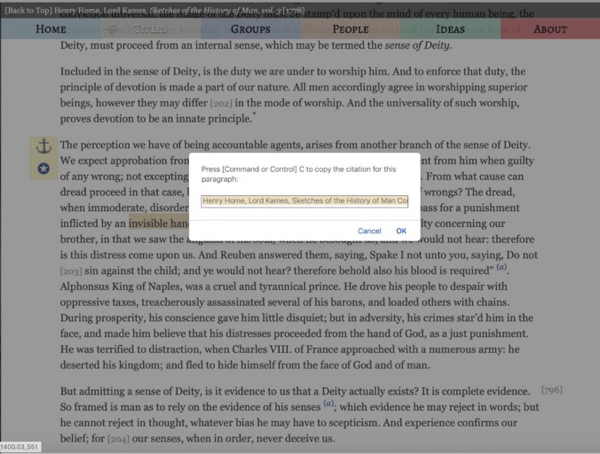
Search all Works by a Particular Author
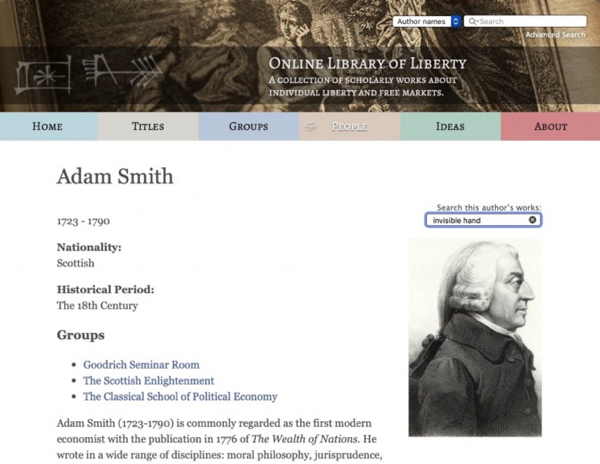
Alternatively, one can search all the texts we have by a particular author, say Adam Smith, to see where else he might have used the term “invisible hand.”
From the main Author Page we have the option to “Search this author’s works.” This search produces four results, one from the Wealth of Nations – the classic formulation of this idea, one from the Theory of Moral Sentiments, and one from his Lecture on Astronomy.
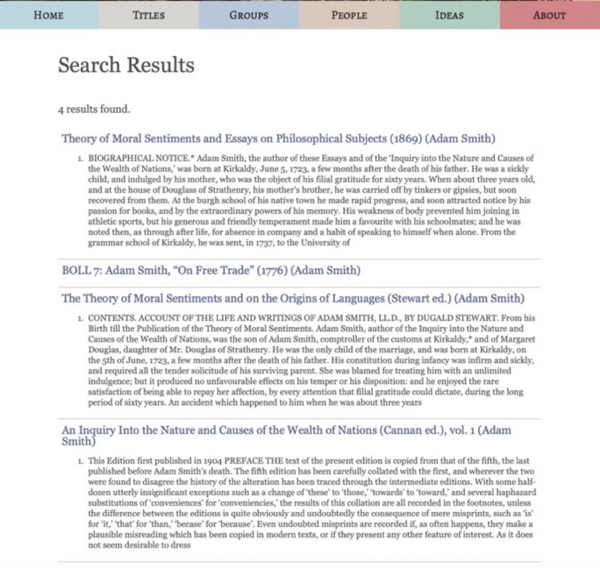
The famous passage from the Wealth of Nations (1776) reads:
But the annual revenue of every society is always precisely equal to the exchangeable value of the whole annual produce of its industry, or rather is precisely the same thing with that exchangeable value. As every individual, therefore, endeavours as much as he can both to employ his capital in the support of domestic industry, and so to direct that industry that its produce may be of the greatest value; every individual necessarily labours to render the annual revenue of the society as great as he can. He generally, indeed, neither intends to promote the public interest, nor knows how much he is promoting it. By preferring the support of domestic to that of foreign industry, he intends only his own security; and by directing that industry in such a manner as its produce may be of the greatest value, he intends only his own gain, and he is in this, as in many other cases, led by an invisible hand to promote an end which was no part of his intention. Nor is it always the worse for the society that it was no part of it. By pursuing his own interest he frequently promotes that of the society more effectually than when he really intends to promote it. I have never known much good done by those who affected to trade for the public good. It is an affectation, indeed, not very common among merchants, and very few words need be employed in dissuading them from it.
On the other hand, we find in The Theory of Moral Sentiments (1759) the following similar passage:
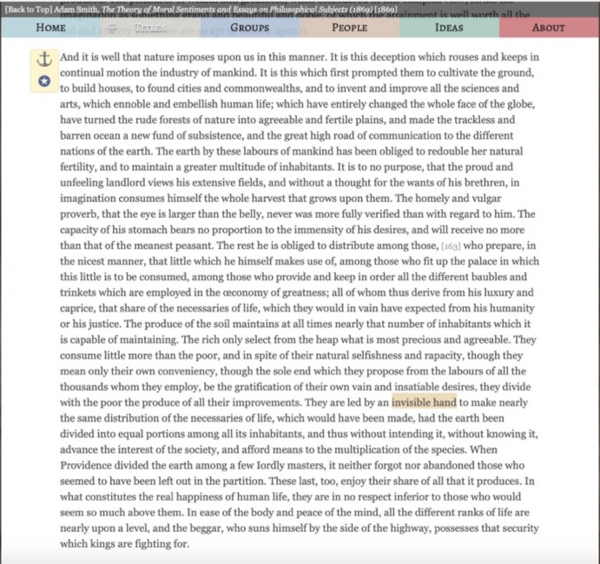
This lesser known passage reads:
The produce of the soil maintains at all times nearly that number of inhabitants which it is capable of maintaining. The rich only select from the heap what is most precious and agreeable. They consume little more than the poor; and in spite of their natural selfishness and rapacity, though they mean only their own conveniency, though the sole end which they propose from the labours of all the thousands whom they employ be the gratification of their own vain and insatiable desires, they divide with the poor the produce of all their improvements. They are led by an invisible hand to make nearly the same distribution of the necessaries of [265] life which would have been made had the earth been divided into equal portions among all its inhabitants; and thus, without intending it, without knowing it, advance the interest of the society, and afford means to the multiplication of the species.
The OLL and the Strategic Refresh

As part of the Strategic Refresh in 2018 I wrote a position paper stating how the OLL pursued the goals and strategies as outlined in what I call LF’s “Founding Documents.”
See the following position papers:
- “The OLL Strategy Document (Feb. and Sept. 2018)”
- “Pierre F. Goodrich’s Goals and Strategy for the Liberty Fund: A Reconstruction (Feb. and June 2018)”
In the OLL Strategy Document I show how the OLL has been designed to pursue PFG’s stated goals in the following way:
- to identify, preserve, and disseminate the “Great Books about Liberty”
- to make these books available for interested individuals to read for themselves
- to provide educational resources outside the traditional universities for this learning to take place by means of what PFG called “manuals” (which would replace the textbooks he hated so much)
- to provide opportunities (what I call “gateways”) for these individuals to explore the great books of liberty further (such as the “Quotations about Liberty and Power” and the “OLL Reader”)
- to show the interconnectedness or interdisciplinary nature of the long tradition of thinking about liberty
- to organise conversations among scholars about key thinkers and key ideas in this tradition, which can be read and enjoyed by others (e.g. the “Liberty Matters” online discussion forum)
The Bastiat and Molinari Translation Projects
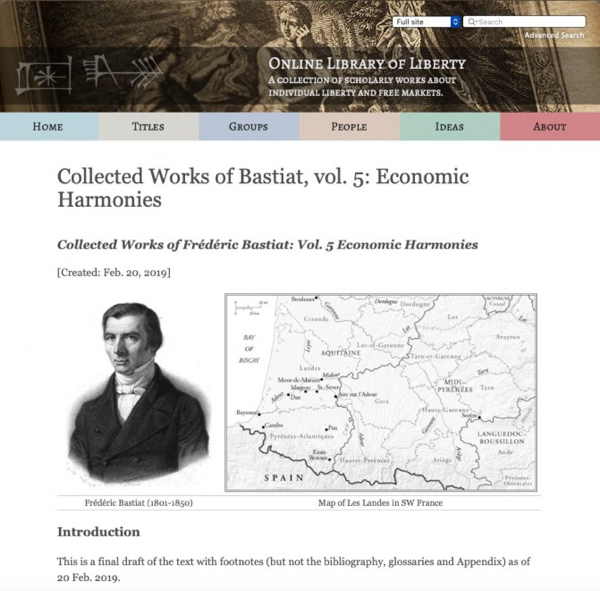
In my spare time I have completed work on two volumes of the Bastiat Collected Works (vol. 4 Miscellaneous Economic Writings and vol. 5 Economic Harmonies) and Molinari’s Evenings on Saint Lazarus Street.
Draft versions of the books have been put on the OLL website so scholars who are familiar with their writings can assist me in finding errors. We had a productive Liberty Matters discussion of Bastiat’s Economic Harmonies in which three economists helped me evaluate Bastiat’s true merits as an economic theorist. We used the final drat of the manuscript I had recently finished as the text for the discussion.
See:
- Collected Works of Bastiat, vol. 4: Miscellaneous Economic Writings https://oll.libertyfund.org/pages/cw4
- Collected Works of Bastiat, vol. 5: Economic Harmonies https://oll.libertyfund.org/pages/cw5
- Gustave de Molinari, Evenings on Saint Lazarus Street: Discussions on Economic Laws and the Defence of Property (1849) https://oll.libertyfund.org/pages/gdm-soirees
- Liberty Matters: David M. Hart, “Reassessing Bastiat’s Economic Harmonies after 160 Years” (May, 2019) https://oll.libertyfund.org/pages/lm-harmonies.
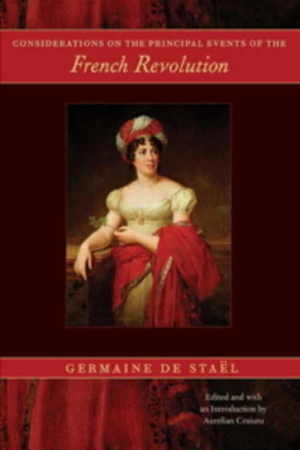
These volumes are part of broader publishing project LF has undertaken since 2002, what I call the “French Political and Economic Thought Project.” Since 2002 Liberty Fund has had a commitment to republishing older translations of classic works of French history and political and economic theory, and translating others for the first time. Some 20 titles comprise the series, several of which are still forthcoming, and are listed below. The titles which have been newly translated for LF are indicated with “T”.
The total number of Pageviews for the collection is 40,498 (3,375 p. m.). The most popular titles with more than 2,000 pageviews are (multi-volume sets are counted as one);
- Tocqueville, Democracy in America (critical edition) - 11,702
- Vattel, The Law of Nations - 9,776
- Tocqueville, Democracy in America (students edition) – 9,486
- Constant, Principles of Politics Applicable to all Governments - 2,767
- Taine, The French Revolution - 2,238
- Guizot, The History of Civilization in Europe - 2,236
- Bastiat, Collected Works - 2,109
The full list in alphabetical order by author’s name is (titles added to OLL or completed in 2018-19 in bold):
- (T) The Collected Works of Frédéric Bastiat. 6 Vols. (2011-). Three volumes have appeared to date.
- Vol. 1: The Man and the Statesman. The Correspondence and Articles on Politics (2011) – 610 pageviews
- Vol. 2: “The Law,” “The State,” and Other Political Writings, 1843-1850 (2012) - 672
- Vol. 3: Economic Sophisms and “What is Seen and What is Not Seen” (2017) – 827
- Vol. 4: Miscellaneous Economic Writings (forthcoming)
- Vol. 5: Economic Harmonies (forthcoming)
- Vol. 6: Writings on Free Trade (forthcoming)
- Pierre Bayle, A Philosophical Commentary on These Words of the Gospel, Luke 14.23, ‘Compel Them to Come In, That My House May Be Full’. (2005) - 792
- Jean-Jacques Burlamaqui, The Principles of Natural and Politic Law (2006) - 710
- (T) Richard Cantillon, Essay on the Nature of Trade in General(2015) (no data yet)
- (T) Condillac, Commerce and Government Considered in their Mutual Relationship (2008) - 265
- (T) Benjamin Constant, Principles of Politics Applicable to all Governments (2003) - 2,767
- (T) Benjamin Constant, Commentary on Filangieri’s Work (2015) - 133
- (T) Benjamin Constant, On Religion (2017) - 432
- Jean Louis De Lolme, The Constitution of England (2007) - 1,414
- Destutt de Tracy, A Treatise on Political Economy (2011) - 309
- (T) Denis Diderot, Encyclopedic Liberty (2016) - 1,461
- François Guizot, The History of Civilization in Europe (2013). [not available online.] An older out of copyright edition - 2,236
- (T) François Guizot, The History of the Origins of Representative Government in Europe (2002) - 1,446
- Commerce, Culture, and Liberty: Readings on Capitalism Before Adam Smith (2003) - 282
- (T) Gustave de Molinari, Evenings on Saint Lazarus Street (1849) (forthcoming).
- (T) Montesquieu, My Thoughts (2012) - 1,158
- Jacques Necker, An Essay on the True Principles of Executive Power in Great States (forthcoming)
- Germaine de Staël, Considerations on the Principal Events of the French Revolution (2008) - 1,170
- Hippolyte Taine, The French Revolution, 3 vols. (2002) - 1,164 + 617 + 457 = 2,238
- (T) Alexis de Tocqueville, Democracy in America: Historical-Critical Edition (2010). 4 vols. - 3,399 + 5,407 + 1,792 + 1,104 (total = 11,702)
- English only students edition, 2 vols. - 5,636 + 3,850 (total = 9,486)
- Emer de Vattel, The Law of Nations (2008) - 9,776